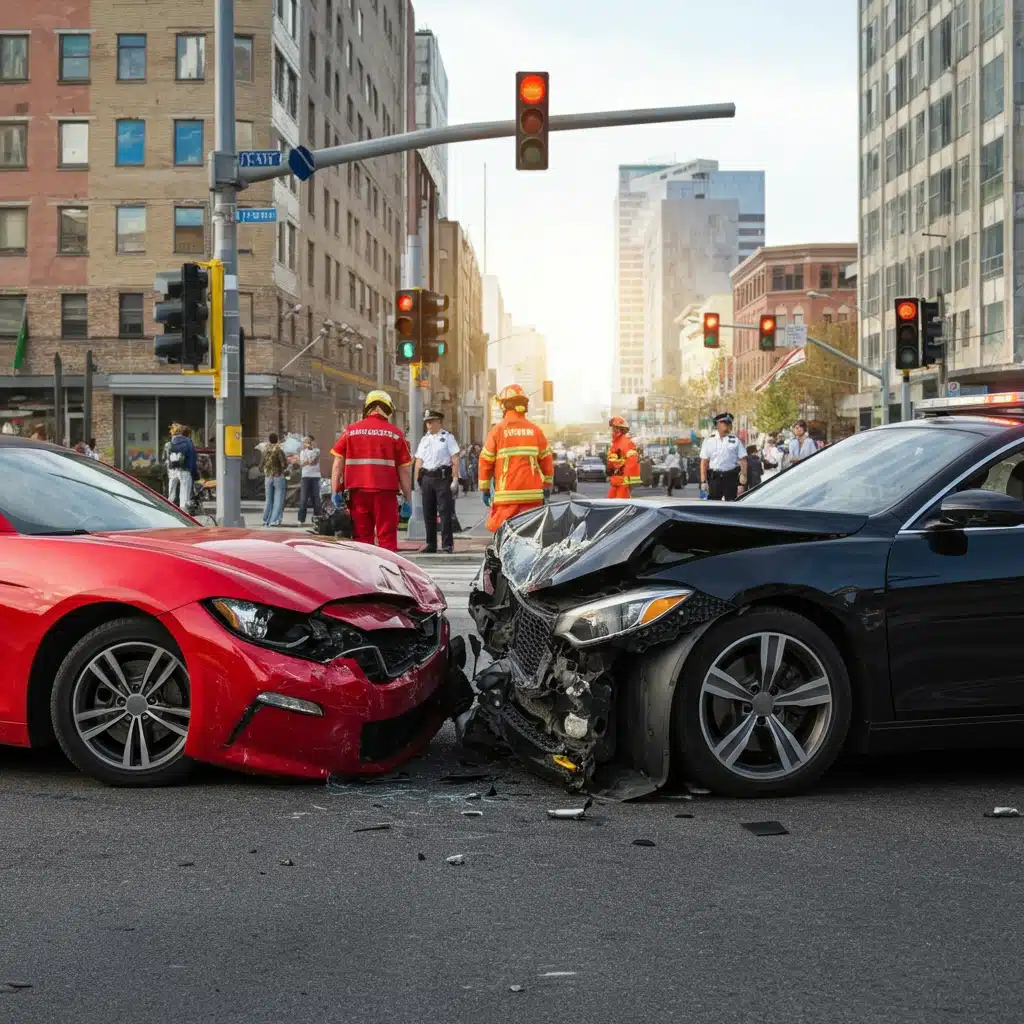“Texas Tough” McKay Law
Texas Car Accident Lawyer
If you’ve been injured in a car accident, you have the right to pursue compensation for your injuries, medical bills, lost income, and emotional distress. In Texas, the ‘fault’ insurance system holds the at-fault driver accountable for covering damages. If your accident was caused by another driver’s negligence, you shouldn’t have to shoulder the financial burden alone. With over 17 years of experience, Lindsey McKay and our dedicated team of car accident attorneys are here to guide you through the legal process and fight for the compensation you deserve.
NO FEES UNLESS WE WIN!
We only get paid when you get paid.
Receive Immediate Medical Care
Get the medical attention you need with no out-of-pocket cost in most cases.
24/7 Access To Us
We are here for you 24/7 so you can focus on healing.
Client Satisfaction
McKay Law has a reputation to be proud of with 300+ 5 star Google Reviews.

McKay Law: Trusted Car Accident Lawyers Fighting for You
Car accidents are a frequent reality in Texas, with heavy traffic, expansive highways, and common factors like distracted driving, speeding, and adverse weather conditions contributing to the risks. For victims, the aftermath often includes mounting medical expenses, vehicle repair costs, and lost income, making recovery overwhelming. That’s where McKay Law comes in.
At McKay Law, our experienced Texas car accident attorneys are dedicated to advocating for your rights. We meticulously gather evidence, negotiate assertively with insurance companies, and build a strong case to secure the compensation you deserve. While you focus on healing, we’ll handle the legal complexities with determination and care.
Let McKay Law be your ally in reclaiming your life after an accident. Contact us today to schedule a consultation and explore your legal options.
What to Do After a Car Accident in Texas
If you’re involved in a car accident in Texas, taking the right steps can safeguard your health and protect your legal rights. Here’s what you should do:
- Stay Calm: Keep a clear head to handle the situation effectively.
- Check for Injuries: Assess yourself and others for injuries. Call 911 immediately if medical attention is needed.
- Move to Safety: If possible and safe, move your vehicle out of traffic to avoid further accidents.
- Call the Police: Texas law requires you to report accidents involving injuries, fatalities, or significant property damage (over $1,000). A police report can also support your insurance and legal claims.
- Exchange Information: Collect names, phone numbers, insurance details, and license plate numbers from all parties involved.
- Document the Scene: Take photos or videos of the damage, license plates, road conditions, and any relevant signs.
- Gather Witness Information: Witness accounts can be crucial in determining fault.
- Avoid Admitting Fault: Be mindful of your words—don’t make statements that could be interpreted as accepting blame.
- Notify Your Insurance: Report the accident promptly and follow your insurer’s claim procedures.
- Seek Medical Attention: Even if injuries seem minor, get checked by a healthcare professional, as symptoms can worsen over time.
- Keep Records: Organize all related documents, including medical bills, repair estimates, and insurance communications.
- Consult an Attorney: Once your immediate needs are addressed, reach out to our experienced Texas car accident attorneys. We specialize in Texas law and will fight to protect your rights.
What to do if your vehicle breaks down
- Stay calm.
- Park as far off the traveled portion of the highway as possible.
- Make your vehicle visible – turn on your flashers.
- Exit the vehicle from the passenger’s side, away from traffic.
- Open the vehicle’s hood and leave it open.
- Tie a light colored cloth to the antennae or door handle.
- If possible, stay with the vehicle until uniformed law enforcement arrives, especially at night or during bad weather.
- Place a “Send Help” sign in a window so it is visible to other motorists.
- If someone stops to help, keep your doors locked, crack a window, and ask them to call law enforcement for help.
- If you decide you must walk, write down:
- Your name.
- The date.
- The time you left.
- The direction you are going.
- The plate number of the vehicle you are riding in.
- Description of the vehicle.
- Name and description of the person you are riding with.
- Notify law enforcement of the location and circumstances in which you left your vehicle.
Tips to avoid collisions and what to do when one occurs
Common Causes of Crashes in Texas
Most crashes in Texas are caused by:
- Speeding
- Failing to yield
- Driving under the influence of alcohol
- Following too closely
- Running red lights or stop signs
Tips to Avoid Collisions
- Adjust your speed to match road conditions.
- Be courteous—yield to other drivers and drive friendly.
- Keep a safe following distance.
- Always check both ways before entering intersections.
- Use your turn signals for every turn and lane change.
- Stop completely at red lights and stop signs.
- Never drive under the influence of alcohol.
What to Do After a Crash
- Check for injuries: Provide aid to anyone hurt.
- Move to safety: If possible, move your vehicle out of traffic to a safe location. Exchange names, contact details, vehicle information, insurance, and driver’s license details.
- Document the scene: Note the crash location and gather witness names and contact information. If vehicles can’t be moved, protect the scene with flares or by raising your hood.
When to Call the Police
Contact the police if:
- There’s an injury or fatality.
- Vehicles cannot be moved.
- A driver appears intoxicated.
- A driver lacks insurance.
- A driver leaves the scene.
When to Move Your Vehicle
If no one is injured, Texas law requires you to move your vehicle out of traffic if it’s drivable. Stop to exchange information if there’s damage. If someone is injured, provide aid and notify law enforcement.
For unattended vehicles, locate the owner or leave a note with your name, address, and the vehicle owner’s details (if the car isn’t yours).
Auto Insurance Requirements
Texas law mandates basic liability coverage. Failing to have insurance can result in fines up to $350 or more for repeat offenses. Always carry your insurance card and report any collision to your insurer immediately.
Were you in a wreck? Tips for auto insurance claims
If you’ve been in a car accident in Texas, collecting the right evidence is crucial to building a strong case for compensation. The Texas Department of Insurance recommends documenting the following:
Photos and Videos
Capture clear images or videos of your injuries, vehicle damage (inside and out), and the accident scene. Include roadway conditions, skid marks, traffic signs, and any other contributing factors.
Driver Information
Exchange names, phone numbers, driver’s license numbers, and insurance details with all involved drivers. Record the make, model, and license plate numbers of their vehicles.
Witness Statements
If there are witnesses, collect their contact information. Their accounts can support your version of events.
Police Report
When officers arrive, they’ll usually file an official report with key details. Be sure to get the report number or a copy for your records.
Medical Records
Seek medical attention, even if you feel fine—some injuries may surface later. Keep all records, including diagnoses, treatment plans, prescriptions, and bills.
Property Damage Estimates
Save repair estimates or invoices for vehicle damage and any personal items lost in the accident.
Personal Journal
Track your recovery journey, noting pain levels, missed work, and how the accident has impacted your daily life. This can serve as valuable evidence of long-term effects.
Gathering this documentation will give you a clearer picture of the crash and what happened afterward—super important for insurance talks or any legal steps you might take. If you’re unsure about how to collect or keep evidence safe, McKay Law is here to guide you!
What Happens After Hiring a Car Accident Attorney?
Below are answers to common questions about what happens after you hire a car accident attorney. This guide is designed to help you feel confident and informed throughout the legal process.
What happens if the case goes to court?
If a settlement cannot be reached, your attorney will file a lawsuit on your behalf and prepare the case for trial. This involves gathering additional evidence, working with experts, and representing you in court. Your attorney will guide you through the process and explain what to expect every step of the way.
What documents or information do I need to provide?
To help your attorney build a strong case, you’ll need to provide:
- Accident reports (e.g., police reports)
- Photos or videos of the accident scene
- Medical records and bills
- Insurance information (yours and the other party’s)
- Witness contact details (if available)
- Any correspondence or documents from insurance companies related to the accident
Make sure to provide anything else your attorney requests to ensure they have all the facts they need.
What should I do while my case is being handled?
During this time, your focus should be on recovering from your injuries and following your medical provider’s recommendations. Avoid discussing your case on social media or with anyone outside of your legal team. If your attorney needs additional information or assistance from you, respond promptly to help keep the process moving smoothly.
How long does the process take?
The length of the process depends on several factors, such as the complexity of your case, the willingness of the insurance company to negotiate, and whether the case goes to court. Some cases may settle within a few months, while others could take over a year. Your attorney will keep you updated throughout each stage of the process.
Will the attorney handle communication with insurance companies?
Yes, your attorney will take over all communication with the insurance companies on your behalf. This includes negotiating settlements, providing necessary documentation, and protecting your rights. This ensures you won’t have to deal with insurance adjusters directly.
What happens immediately after I hire a car accident attorney?
Once you hire an attorney, they will start by reviewing the details of your case thoroughly. This may include an initial consultation to discuss the accident, gathering evidence, and assessing damages. Your attorney will also notify the involved parties (e.g., insurance companies) that they are representing you, so they can take over communications on your behalf.
How are legal fees handled?
Car accident attorneys typically work on a contingency fee basis. This means they only get paid if they win your case or secure a settlement for you. The fee is usually a percentage of the settlement or judgment. Your attorney will explain their fee structure clearly when you hire them, so there are no surprises.
By hiring a car accident attorney, you’ve taken an important step toward protecting your rights and seeking fair compensation. Rest assured that your attorney will guide you through each step of the process and work toward achieving the best possible outcome for your case.
Is Texas Considered An At Fault State?
Yes, Texas is an at-fault state when it comes to car accidents. This means that the driver who is determined to be responsible for causing the accident is also responsible for covering the damages and injuries resulting from the crash. In Texas, fault is established based on evidence such as police reports, witness statements, and other relevant documentation. Once fault is determined, the at-fault driver’s insurance company typically pays for the damages up to the policy limits. This system differs from no-fault states, where each driver’s insurance covers their own damages regardless of who caused the accident.
In an at-fault state like Texas, injured parties have several options for seeking compensation. They can file a claim with their own insurance company, pursue a claim against the at-fault driver’s insurance, or even file a lawsuit if the damages exceed the insurance coverage. Texas also follows a “modified comparative negligence” rule, which means that if you are found to be partially at fault for the accident, your compensation may be reduced by your percentage of fault. However, if you are more than 50% at fault, you cannot recover damages. This system emphasizes the importance of determining fault accurately and having adequate insurance coverage.
What is my car accident case worth in Texas?
The value of a car accident case in Texas can vary widely depending on several factors. Here are the key elements that can influence the worth of your case:
Medical Expenses: Includes current and future medical bills for injuries sustained in the accident (e.g., hospital stays, surgeries, physical therapy, medications).
Lost Wages: Compensation for income lost due to time off work during recovery, as well as potential future lost earning capacity if the injuries affect your ability to work.
Property Damage: Covers the cost of repairing or replacing your vehicle and any other personal property damaged in the accident.
Pain and Suffering: Non-economic damages for physical pain, emotional distress, and reduced quality of life caused by the accident.
Severity of Injuries: Cases involving severe or permanent injuries (e.g., spinal cord injuries, traumatic brain injuries) typically result in higher settlements or awards.
Liability: The degree to which each party is at fault can impact the case value. Texas follows a “modified comparative fault” rule, meaning your compensation may be reduced if you are partially at fault.
Insurance Coverage: The at-fault party’s insurance policy limits and your own uninsured/underinsured motorist coverage can affect the amount you can recover.
Punitive Damages: In cases of gross negligence (e.g., drunk driving), you may be entitled to punitive damages, which are meant to punish the at-fault party.
Legal Representation: Having an experienced personal injury attorney can help maximize your case value by negotiating with insurance companies and presenting a strong case in court if necessary.
Each case is unique, so consulting with a personal injury attorney in Texas is the best way to get an accurate estimate of your case’s worth.
What Does It Cost to Hire a Car Accident Attorney?
Worried about the cost of legal help after an accident? At McKay Law, we make it simple and stress-free. Our experienced Texas car accident attorneys work on a contingency fee basis, which means you don’t pay us unless we win your case. Here’s how it works:
- No upfront costs – We handle all initial expenses.
- Free consultations – Discuss your case with us at no charge.
- Pay only if we win – Our fee is a percentage of the settlement or verdict we secure for you.
This approach ensures that top-tier legal representation is available to everyone, no matter their financial situation. Have questions about our contingency fees? Contact us today to schedule your free consultation and case review.
Understanding Your Texas Accident Report (CR-3)
Your Texas Accident Report, also known as a CR-3, provides a detailed summary of the crash from the investigating officer’s perspective. It typically includes:
- Essential Details: Date, time, and location of the accident.
- Driver & Vehicle Information: Details about all parties involved.
- Contributing Factors: Codes that indicate potential causes, such as speeding or distracted driving.
- Narrative & Diagram: A written account and visual representation of how the accident occurred, including vehicle positions.
If you’re unclear about any part of the report, refer to the reference key or contact the agency that issued it. This guide is here to help you make sense of the information.
What Are The Most Common Types of Car Crash Injuries In Texas?
The most common types of car crash injuries in Texas include:
- Whiplash – A neck injury caused by sudden back-and-forth movement.
- Broken or Fractured Bones – Common in high-impact collisions.
- Head Injuries – Including concussions and traumatic brain injuries.
- Spinal Cord Injuries – Leading to potential paralysis or chronic pain.
- Internal Bleeding – Often from blunt force trauma.
- Cuts and Scrapes – From shattered glass or debris.
- Emotional Injuries – Such as PTSD or anxiety following an accident
Even if an injury appears minor initially, seeking prompt medical attention is essential, as some conditions may not present symptoms immediately. Once your health is addressed, it’s wise to consult a Texas car accident injury lawyer. An experienced attorney can explain your rights and assist in pursuing compensation for medical bills, lost wages, and the physical and emotional toll of your injuries.
Step-by-Step Overview of Your Auto Accident Case with McKay Law
Dealing with the aftermath of an auto accident can be overwhelming. Medical bills, insurance claims, and financial stress often create confusion and uncertainty. At McKay Law, we understand the challenges you face, and our goal is to guide you through every step of your case with clarity, confidence, and compassion. We will outline what you can expect when you choose McKay Law to represent you in your auto accident case.
Initial Consultation: Understanding Your Case
Every successful case begins with a thorough understanding of your unique situation. During your free initial consultation with McKay Law, we’ll take the time to listen to your story. This is your opportunity to share everything about the accident, from how it occurred to the injuries and losses you’ve suffered.
We focus on three key aspects during this phase:
- Gathering Facts: We’ll ask detailed questions about the incident to get a complete picture.
- Assessing Liability: We’ll evaluate who may be legally responsible for the accident.
- Exploring Your Goals: Whether you seek compensation for medical bills or accountability for a negligent driver, we’ll tailor our approach to align with your goals.
By the end of the consultation, you’ll have a clear understanding of your legal options and the potential next steps to take.
Investigation: Building a Strong Case
The foundation of a successful claim is a strong investigation. At McKay Law, we have a dedicated team of legal and investigative professionals who specialize in uncovering critical evidence to support your case.
Key components of our investigation include:
- Collecting Evidence: This may involve accident scene photos, police reports, surveillance footage, and witness statements.
- Assessing Damages: We’ll work with medical professionals and financial experts to document the full scope of your injuries and losses.
- Reconstructing the Scene: If necessary, we can collaborate with accident reconstruction experts to establish exactly what happened and who was at fault.
Our meticulous approach ensures that no detail is overlooked, allowing us to build the strongest possible case on your behalf.
Filing a Claim: Pursuing Justice
Once the investigation is complete, the next step is to file a claim. This often involves submitting a demand letter to the at-fault party’s insurance company. Here’s what happens during this phase:
- Demand Letter: Our team will craft a detailed letter outlining the facts of the case, the evidence supporting liability, and the damages you have incurred. This is often the first formal step in seeking compensation.
- Insurance Communication: We’ll handle all correspondence with the insurance company, shielding you from the stress and complexity of these interactions.
- Legal Filing (if needed): If the insurance company refuses to offer a fair settlement, McKay Law is prepared to file a lawsuit and take your case to court.
Our attorneys are skilled negotiators and aggressive litigators, so whether your case is resolved through a claim or litigation, you’ll have a strong advocate by your side.
Negotiation: Reaching a Fair Settlement
Negotiations with insurance companies can be challenging. Adjusters often attempt to minimize payouts, but at McKay Law, we know their tactics and are prepared to counter them. During this phase, you can expect:
- Expert Advocacy: Our team will negotiate assertively to seek a settlement that fully compensates you for your losses, including medical expenses, lost wages, and pain and suffering.
- Open Communication: We’ll keep you informed at every stage, ensuring you understand any settlement offers and what they mean for your case.
- Focus on Your Best Interests: If we believe a settlement offer is insufficient, we’ll advise you on your options for moving forward, even if that means taking the case to trial.
Our experience and dedication to protecting your rights ensure that your voice is heard and your interests are prioritized.
Resolution: Achieving the Best Outcome
The final phase of your case involves reaching a resolution, whether through a settlement or a court verdict. Here’s what to expect:
- Disbursement of Funds: Once a settlement or judgment is secured, our team will ensure that you promptly receive the compensation you’re entitled to.
- Support Beyond the Case: At McKay Law, we don’t consider our job done when your case is resolved. We’re here to answer any lingering questions and provide guidance on any related issues that may arise.
Our ultimate goal is to help you achieve peace of mind and financial recovery, setting the stage for you to move forward with confidence.
Texas Traffic Crash Report 2024
This report provides a detailed summary of motor vehicle traffic crash statistics for Texas in the year 2024. The following key insights highlight major trends and data points:
Fatality Rates and General Statistics
- Fatality Rate: 1.35 deaths per hundred million vehicle miles traveled in 2024, marking a 5.25% decrease compared to 2023.
- Total Fatalities: 4,150 motor vehicle traffic deaths occurred in 2024, a 3.29% decrease from 4,291 fatalities in 2023.
- Annual Vehicle Miles Traveled: Texas motorists traveled 307.490 billion miles in 2024, showing a 2.07% increase from the 301.254 billion miles traveled in 2023.
Serious Injuries and Crashes
- There were 14,905 serious injury crashes, resulting in 18,218 serious injuries.
- Overall, 251,977 people were injured in reportable motor vehicle traffic crashes.
Rural Crashes
- Rural Traffic Fatalities: Crashes in rural areas accounted for 50.12% of the state’s fatalities, with 2,080 deaths occurring in these areas.
Types of Fatal Crashes
- Single-Vehicle, Run-Off Road Crashes: These crashes caused 1,353 fatalities, representing 32.60% of total deaths.
- Intersection-Related Fatalities: 1,050 people were killed in crashes at or related to intersections.
- Head-On Collisions: Head-on accidents resulted in 617 fatalities.
- Days with Multiple Fatalities:
- May 24th (Friday) and October 27th (Sunday) were the deadliest days, with 27 fatalities each.
- October was the deadliest month, with 391 fatalities recorded.
Crash Timing and Frequency
- Frequency of Fatalities and Injuries:
- 1 person died every 2 hours and 7 minutes.
- 1 person was injured every 2 minutes and 5 seconds.
- 1 reportable crash occurred every 57 seconds.
- There were no deathless days on Texas roadways in 2024.
- Severe Multi-Fatality Crashes:
- 3 crashes in 2024 resulted in 6 or more fatalities each.
Restraint Usage and Occupant Protection
- Among people killed in vehicles with available restraints, 45.34% were not restrained at the time of the crash.
Motorcyclist and Non-Motorist Fatalities
- Motorcyclists:
- A total of 585 motorcyclists were killed, with 37% not wearing helmets at the time of the crash.
- Pedestrian Fatalities:
- 768 pedestrians died in traffic crashes, marking a 5.19% decrease compared to 2023.
- Pedalcyclist Fatalities:
- 78 pedalcyclists were killed, representing a significant 26.42% decrease compared to 2023.
DUI and Distracted Driving Crashes
- Alcohol-Related Fatalities:
- 1,053 people died in crashes involving a driver under the influence of alcohol—25.37% of total fatalities.
- DUI-related crashes occurred most frequently between 2 a.m. and 2:59 a.m. on Sundays.
- Distracted Driving Fatalities:
- 380 fatalities were linked to distracted driving, showing a 5.71% decrease compared to 2023.
Additional Notes
- Bridge Collapse Fatalities:
- There were no fatalities caused by bridge collapses in 2024.
This report illustrates both achievements and challenges on Texas roadways in 2024, showcasing reductions in overall fatalities, serious injuries, and specific crash types such as pedestrian fatalities and distracted driving incidents. However, areas like rural roadway deaths and restraint usage highlight critical improvement opportunities for 2025.
Will My Car Accident Case Be Settled or Go to Court?
If you’ve been injured in a Texas car accident, you’re likely wondering whether your case will be resolved through a settlement or if it will require a court trial. Here’s what you should know:
In many cases, it’s possible to reach a fair settlement with the at-fault party’s insurance company without ever going to court. Settlements can save time, reduce legal costs, and provide compensation more quickly.
However, some insurance companies may attempt to minimize your injuries or downplay their client’s responsibility, offering less than what you deserve. If negotiations reach a standstill, filing a lawsuit and taking the case to court may be necessary to secure fair compensation.
If your case does go to trial, you can trust McKay Law to stand by your side. With extensive experience and resources, we’ll protect your rights at every step of the litigation process. Whether through a swift settlement or a trial verdict, our priority is achieving the best possible outcome for you.
Understanding Different Types of Car Accidents in Texas
Car accidents are an unfortunate reality on Texas roads, and understanding their causes and effects can be key to prevention and proper response. Below, we’ll explore various types of collisions, the factors that contribute to them, and how they impact those involved. Whether you’re a driver, pedestrian, or passenger, staying informed about these incidents can help you stay safer on the road.
Distracted Driving Accidents
Losing focus while driving—even for a second—can lead to a life-changing crash. Common distractions include texting, eating, adjusting the radio, or using navigation systems. These moments of inattention are entirely preventable but often result in severe consequences.
Key Takeaway:
Always stay focused on driving. Consider silencing your phone and pulling over to a safe spot if you need to perform an activity that requires your full attention.
Drugged Driving Accidents
Driving under the influence of drugs—whether prescription or illegal—impairs judgment, slows reaction times, and endangers everyone on the road. Even medications intended to help can cause drowsiness or delayed reflexes, making operating a vehicle dangerous.
Key Takeaway:
If a medication affects your ability to concentrate or stay alert, arrange for alternative transportation. Never mix driving with drug use.
Drunk Driving Accidents
Alcohol remains one of the leading causes of fatal accidents in Texas. It reduces coordination and significantly slows reaction time, making it nearly impossible to respond quickly to road hazards. Drunk driving is entirely preventable, yet it continues to claim lives every year.
Key Takeaway:
Plan ahead—use a designated driver, rideshare, or taxi if you plan to drink.
Head-On Collisions
Head-on crashes occur when two vehicles collide front-to-front. Due to the combined force of impact, these accidents often result in catastrophic injuries or fatalities.
Key Takeaway:
Stay in your lane, never pass on a two-lane road unless it’s safe, and avoid distractions that could cause you to swerve.
Hit-and-Run Accidents
A hit-and-run happens when a driver involved in a collision leaves the scene without providing necessary information or assisting injured parties. This leaves victims struggling to cope with both injuries and the legal challenges of identifying the at-fault driver.
Key Takeaway:
Always stay at the scene of an accident to render aid, exchange information, and comply with legal obligations.
Intersection Accidents
High-traffic intersections are common hot spots for crashes due to the volume of vehicles, pedestrians, and cyclists, combined with multiple turn lanes and signals. A simple miscalculation or failure to yield can lead to serious consequences.
Key Takeaway:
Approach intersections cautiously, obey signals, and always check for pedestrians and turning vehicles before proceeding.
Multi-Car Accidents
Multi-vehicle pileups often result from chain-reaction collisions involving three or more cars. These accidents can complicate fault determination, delay emergency responses, and increase injury claims.
Key Takeaway:
Maintain a safe following distance and reduce speed during adverse weather or heavy traffic.
Parking Lot Accidents
While often low-speed, parking lot collisions can still result in injuries—especially for pedestrians—along with costly damage to vehicles. Poor visibility and a lack of clear right-of-way rules often contribute to these incidents.
Key Takeaway:
Drive slowly and stay alert in parking lots. Use caution when backing out of spaces or navigating crowded areas.
Rear-End Collisions
Rear-end accidents usually happen when one driver follows another too closely or fails to react to sudden stops. These crashes often lead to injuries like whiplash or back pain, even at low speeds.
Key Takeaway:
Keep a safe following distance and stay attentive to both traffic flow and brake lights ahead of you.
Rollover Accidents
Rollover accidents occur when a vehicle tips onto its side or roof, often because of high speeds, sharp turns, or a collision. SUVs and trucks are particularly vulnerable due to their higher center of gravity, and these accidents frequently result in serious injuries.
Key Takeaway:
Drive cautiously, especially in taller vehicles. Avoid abrupt maneuvers and excessive speed.
Single-Vehicle Accidents
A single-vehicle crash involves only one car and often occurs due to issues like poor road conditions, driver error, or mechanical failure. These accidents might include hitting a tree, a guardrail, or rolling off the road.
Key Takeaway:
Drive at safe speeds, pay attention to road conditions, and keep your vehicle in good working order.
Speeding Accidents
Exceeding the speed limit reduces a driver’s ability to react and control the vehicle in time to avoid accidents. Speed-related crashes often cause severe injuries or fatalities due to the increased force of impact.
Key Takeaway:
Follow posted speed limits and adjust your speed based on weather, traffic, and road conditions.
T-Bone Accidents
T-bone crashes occur when one car’s front strikes the side of another, often at intersections. These side-impact collisions can be extremely dangerous, especially for occupants on the struck side of the vehicle.
Key Takeaway:
Double-check intersections before proceeding, even if you have the right-of-way.
Rehabilitation After Accidents
Serious accidents often require long-term care, such as physical therapy, surgery, or other rehabilitation efforts. For some, these injuries result in permanent disabilities, creating financial and emotional challenges.
Key Takeaway:
Seek medical attention immediately after an accident to assess potential injuries. Understand your right to seek compensation for medical and rehabilitation expenses.
The Importance of Safety Awareness
Knowing the types and causes of accidents can help you become a more mindful driver. Taking simple precautionary measures—like wearing your seatbelt, avoiding distractions, and following traffic laws—can significantly reduce your risk.
By staying alert, vigilant, and prepared, you can help keep Texas roads safe for everyone. Drive responsibly, and remember that small actions can make a big difference when it comes to preventing accidents.
The Texas Tough Difference
See why so many others choose McKay Law, PLLC
With over 300 five-star reviews, McKay Law, your local Personal Injury Law Firm has earned the trust and gratitude of our clients. Every case we handle is unique, and every client’s story matters. Don’t just take our word for it—hear directly from our clients about their experiences and why they confidently recommend us to others.






